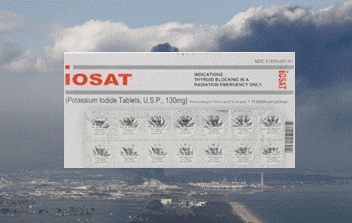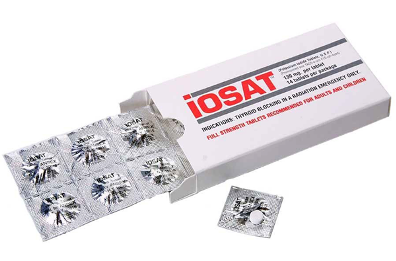GET READY FOR SURVIVAL MODE
1.877 282-7673

GET READY FOR SURVIVAL MODE

How Potassium Iodide Works
Certain forms of iodine help your thyroid gland work right. Most people
get the iodine they need from foods like iodized salt or fish. The
thyroid can "store" or hold only a certain amount of iodine.
In a
radiation emergency, radioactive iodine may be released in the air. This
material may be breathed or swallowed. It may enter the thyroid gland
and damage it. The damage would probably not show itself for years.
Children are most likely to have thyroid damage.
If you take
potassium iodide, it will fill up your thyroid gland. This reduces the
chance that harmful radioactive iodine will enter the thyroid gland.
Who Should Not Take Potassium Iodide
The only people who
should not take potassium iodide are people who know they are allergic
to iodide. You may take potassium iodide even if you are taking
medicines for a thyroid problem (for example, a thyroid hormone or
antithyroid drug). Pregnant and nursing women and babies and children
may also take this drug. There are approximately 100 commercial
nuclear plants in the United States, each with one or more reactors. It
is estimated that a "Chernobyl-sized" accident could spread radioiodine
for hundreds of miles around each. Many people (especially in the
Northeast) live within the danger radius of multiple plants.
How And When To Take Potassium Iodide
Potassium iodide should be taken as soon as possible after public
health officials tell you. You should take one dose every 24 hours. More
will not help you because the thyroid can "hold" only limited amounts of
iodine. Larger doses will increase the risk of side effects. You will
probably be told not to take the drug for more than 10 days.
Side Effects
Usually side effects of potassium iodide happen
when people take higher doses for a long time. You should be careful not
to take more than the recommended dose or take it for longer than you
are told. Side effects are unlikely because of the low dose and the
short time you will be taking the drug.
Possible side effects
include skin rashes, swelling of the salivary glands, and "iodism"
(metallic taste, burning mouth and throat, sore teeth and gums, symptoms
of a head cold, and sometimes stomach upset and diarrhea). A few
people have an allergic reaction with more serious symptoms. These could
be fever and joint pains, or swelling of parts of the face or body and
at times severe shortness of breath requiring immediate medical
attention.
Taking iodide may rarely cause overactivity of the
thyroid gland, underactivity of the thyroid gland, or enlargement of the
thyroid gland (goiter).
All IOSAT is fully FDA approved for
thyroid blocking in a radiation emergency. Each standard package of
IOSAT Potassium Iodide contains a strip of 14 tablets, with each tablet containing 130 mg
of potassium iodide. The tablets are double scored to split easily and
cleanly into 65 and 32.5 child doses.

In Stock
Iosat Potassium Iodide
pkg. 14
$14.95